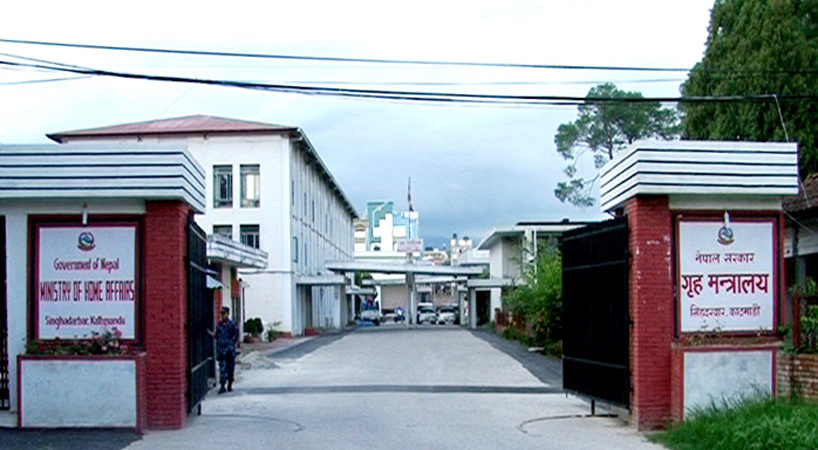Govt unveils action plan to contain monsoon disaster

Purushottam Khatri / Kathmandu: The government has unveiled ‘Monsoon Preparedness and Detail Action Plan-2020′ for better readiness, rescue, and relief operation aiming to combat possible human casualties and loss of property.
National Disaster Risk Reduction and Management Authority (NDRRMA) under the Ministry of Home Affairs prepared and made pubic the Action Plan.
This is the second time that the Ministry of Home Affairs has brought the Action Plan into effect after collecting all the details and work plan from each government line agency, including the security bodies.
The Authority has issued the detailed Action Plan to be executed by all the line ministries and security bodies, Anil Pokhrel, chief executive officer of the Authority, told The Rising Nepal.
Each line ministry, security body and various national and local level social organisation, including the National Red Cross, will carry out their respective responsibilities under the detailed Action Plan, Pokhrel said.
The NA has submitted the details of their human resources for the monsoon emergency Action Plan and as per the details, 134 personnel in each district-based Battalion (104 forces and 30 additional troop from Company level office of the district) are put in ready position. The NA has also mentioned that it would be difficult to conduct a free rescue operation this year due to COVID-19 pandemic.
The Nepal Army’s action plan has suggested the government to relocate people living in the plains, which may face floods and inundation and the houses that are along the embankments.
The NA suggested keeping required number of PPEs and face masks in ready situation for both the rescuers and victims during the time of rescue and relief distribution.
While conducting rescue operation in the COVID-19-hit districts, the rescuers were advised to compulsorily wear PPEs, face masks, gloves and use the COVID-19 infection-free stretchers rather than normal ones.
The NA has kept five Acrow bridges provided by the US government, two Riverine boats, 52 outboard motor (OBM) boats, 34 inflatable boats, and 33 rubber boats in ready condition for this monsoon season.
Acrow bridge is normally used to pass vehicles and humans temporarily in case concrete bridges and highways collapse.
The NA has also kept one helicopter each in the Eastern Division Headquarters, Itahari, Bharatpur in Chitwan, Western Division Headquarters in Pokhara, and Western Air Base in Surkhet and Central Air Base in Kathmandu stand-by for conducting rescue operation.
Similarly, the Nepal Police said that it has kept 38 highly skilled and trained swimmers, 219 swimmers, 256 normal swimmers, and 38 boat riders in a ready position in the Metropolitan Police Office and seven State Police Offices.
The Nepal police from the Federal to the State level were advised to keep the records of the monsoon disasters and updates at the Metropolitan Offices, State Police Offices and District Police Offices by listing out districts as highly COVID-19 affected, affected and less affected districts.
Nepal Police Headquarters has kept 1,085 forces in ready position dividing 155 forces for each State.
According to the Action Plan, except the ready forces of 1085, Nepal Police has 662 additional forces of only trained manpower to be used in any type of disaster. Disaster Management Division of Nepal Police Headquarters, Samakhusi, has the highest number of trained manpower with 228 forces.
Nepal Police has just 16 heavy equipment to be mobilised in any emergency. Of the total, 10 alone were at the Police Headquarters and Metropolitan Police Office in Kathmandu. There are three heavy equipment in Bagmati State of Nepal Police, two in Gandaki State and one in State 1.
Nepal Police lacks heavy equipment in States 2, 5, Karnali and Sudurpaschim. Nepal Police also has its 15 rubber boats across the country.
Meanwhile, Armed Police Force has kept 1,117 skilled natural disaster trained human resource in ready position. Last year, the number was at 1,420.
The APF has 56 human resources for conducting search and rescue in collapsed structures, firefighting equipment 32, rappelling equipment 26, deep diving equipment 25, outboard motors three, rescue rafts 23, life jackets 972, life detecting equipment four, and heavy equipment 13.
As per the Action Plan, the Authority has kept the National Emergency Operation Centre (NEOC) at the Federal level, State Emergency Operation Centre (SEOC), District Emergency Operation Centre (DEOC), Local Emergency Operation Centre (LEOC) in 24/7 alert condition.
According to Bedh Nidhi Khanal, under-secretary at the Home Ministry, more than 80 per cent of the total population of Nepal are at risk of natural hazards, such as floods, landslides, windstorms, hailstorms, fires, earthquakes, and Glacial Lake Outburst Floods (GLOFs).
Nepal is the 20th most disaster-prone country in the world.
